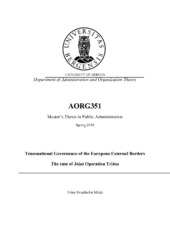| dc.description.abstract | Frontex plays an important role in assisting European Union Member States towards ensuring effective and coherent management of its external borders. This study examines the way that Frontex and member states work together by using a network theory approach to this question, which places emphasis on issues including sensemaking, coordination and legitimacy. The overall aim is to differentiate between different types of networks and, based on the mentioned theoretical concepts, assess what type of network Frontex coordinated operations are. The focus is on Joint Operation Triton as the empirical case. The data material is based on operational documents and legal texts, and information from semi-structured interviews. The findings suggests that Frontex shows noteworthy features of a lead agency when organising JO Triton, but that there are also some elements of horizontal cooperation in the performance of tasks by the EU member states. Therefore, the argument is that the lead agency network model may provide a plausible description of JO Triton. The findings indicate that Frontex takes a leading role in organising JO Triton by framing the problem in technical terms concerning border control. This is perceived to enable cooperation by member states by mediating differences in opinions regarding migration. In terms of cooperation, Frontex appear to have a considerable role in planning the operation and overseeing its implementation. Furthermore, legitimacy is assumed to be expressed through controlled accountability and through providing substantial problem-solving. This thesis further argues that Frontex’ prominent role in JO Triton can be explained as an instrumental and “means to an end” approach to the migration crisis, where an enhanced role from the EU-level was perceived as necessary in order to heighten EU solidarity. | en_US |
